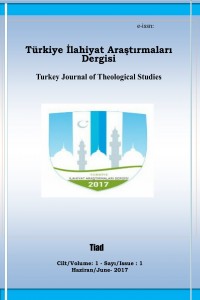Abstract
İslam
bir din olarak sosyal adaleti gerçekleştirmeyi ve refahı toplumun tüm
kesimlerine yaymayı amaçlar. İslam hukukunda bu hedefe ulaşmak için bir takım
gerekli düzenlemeler yapılmıştır. Maslahat kapsamında yer alan bu
düzenlemelerin hedefi tarafların menfaatini koruma ve zarar görmelerini önleme
olarak ifade edilebilir. İktisadi hayata ait düzenlemeler de bu kapsamda
değerlendirilir.
Ekonomik
sıkıntıların yaşandığı, yüksek enflasyon oranının görüldüğü dönemlerde para
değer kaybına uğramaktadır. Bunun sonucunda alacaklı konumda olan kimse için
bir zararı ortaya çıkmaktadır. İslam hukukun genel prensiplerine göre bu zarar
giderilmelidir. Bu da ancak değer kaybının ödenmesiyle mümkündür.
İslam Hukukunda paranın
değer kaybının ödenmesi bir takım hukuki esaslara dayanmaktadır. Bu makalede bu hukuki esaslar belirlenmeye çalışılacaktır.
Keywords
References
- Bakkal, Ali, “İslam Hukukunda Para Faiz Telakkisi Zaviyesinden Enflasyon Farkının Ödenmesi Problemi”, Harran Üniversitesi İlahiyat Fakültesi Dergisi, Sayı I, Şanlıurfa, 1995.
- Buhârî, Ebû Abdillâh Muhammed b. İsmâîl, Sahîhu’l-Buhârî, Dâru Tûki’n-Necât 1422/2001.
- Dönmez, İbrahim Kâfi, “Maslahat”, Türkiye Diyanet Vakfı İslam Ansiklopedisi (DİA), İstanbul 2003, c. XXVIII, ss. 79-94.
- Heyet, Mecelle, Mecelle-i Ahkam-ı Adliye, Ali Himmet Berki Neşri, İstanbul, Hikmet Yayınları, 1985.
- İbn Abidin, Muhammed Emin b. Ömer, Redd’ul-Muhtâr ale’d-Durri’l-Muhtâr, Beyrut, Dâru’l-Fikr, 1412/1992.
- İbn Abidin, Muhammed Emin b. Ömer, Tenbih’ur-Rukûd ala Mesâili’n-Nukûd, Mecmuatu’r-Resail, Mektebetü’l-İslamiyye, tsz.
- İbn Kudâme el-Makdisî, Ebû Muhammed Muvaffakuddin Abdullah b. Ahmed, el-Muğnî, Mektebetu’l-Kâhire tsz.
- İbn Mâce, Ebû Abdillâh Muhammed b. Yezîd el-Kazvînî, Sünen, Dâru’r-Risâleti’l-İlmiyye 1430/2009.
- Kâsânî, Alâüddîn Ebû Bekr b. Mes‘ûd, Bedâiu’s-Sanâi’ fî Tertîbi’Şerâi’, Dâru’l-Kutubu’l-İlmiyye 1406/1986.
- Nevevî, Ebû Zekeriyya Muhyiddin Yahya b. Şeref, el-Mecmû Şerhu’l-Muhezzeb, Beyrut, Dâru’l-Fikr, tsz.
- Remlî, Şemseddin Muhammed b. Ahmed, Nihâyetu’l-Muhtâc ilâ Şerhi’l-Minhâc, Beyrut, Dâru’l-Fikr, 1404/1984.
- Serahsi, Şemsu’l-Eimme Muhammed b. Ahmed, el-Mebsut, Beyrut, Dâru’l-Marife, 1414/1993.
- Zuhayli, Vehbe, Fıkhu’l-İslâmî ve Edilletuhu, Dımeşk, Dâru’l-Fikr, tsz.
Abstract
Islam, as a religion aims to realize social
justice and to spread welfare to all segments of the society. In Islamic law, a number of necessary
arrangements have been made to achieve this goal. It may be expressed that
these regulations, which fall within the scope of maslaha (general
interest) are intended for protecting the interests of the parties and
preventing their harm. Regulations of economic life are also evaluated within
this scope.
During the periods of economic crises and high
inflation money loses its value. As a result, a loss emerges for the creditor.
According to the general principles of Islamic law, the creditor must be
reimbursed for any financial loss incurred. This is only possible through
providing him with the compensation for the loss of monetary value.
Islamic Law has
established a set of principles concerning the compensation for the loss of
monetary value. This paper endeavors to specify these legal regulations.
Keywords
References
- Bakkal, Ali, “İslam Hukukunda Para Faiz Telakkisi Zaviyesinden Enflasyon Farkının Ödenmesi Problemi”, Harran Üniversitesi İlahiyat Fakültesi Dergisi, Sayı I, Şanlıurfa, 1995.
- Buhârî, Ebû Abdillâh Muhammed b. İsmâîl, Sahîhu’l-Buhârî, Dâru Tûki’n-Necât 1422/2001.
- Dönmez, İbrahim Kâfi, “Maslahat”, Türkiye Diyanet Vakfı İslam Ansiklopedisi (DİA), İstanbul 2003, c. XXVIII, ss. 79-94.
- Heyet, Mecelle, Mecelle-i Ahkam-ı Adliye, Ali Himmet Berki Neşri, İstanbul, Hikmet Yayınları, 1985.
- İbn Abidin, Muhammed Emin b. Ömer, Redd’ul-Muhtâr ale’d-Durri’l-Muhtâr, Beyrut, Dâru’l-Fikr, 1412/1992.
- İbn Abidin, Muhammed Emin b. Ömer, Tenbih’ur-Rukûd ala Mesâili’n-Nukûd, Mecmuatu’r-Resail, Mektebetü’l-İslamiyye, tsz.
- İbn Kudâme el-Makdisî, Ebû Muhammed Muvaffakuddin Abdullah b. Ahmed, el-Muğnî, Mektebetu’l-Kâhire tsz.
- İbn Mâce, Ebû Abdillâh Muhammed b. Yezîd el-Kazvînî, Sünen, Dâru’r-Risâleti’l-İlmiyye 1430/2009.
- Kâsânî, Alâüddîn Ebû Bekr b. Mes‘ûd, Bedâiu’s-Sanâi’ fî Tertîbi’Şerâi’, Dâru’l-Kutubu’l-İlmiyye 1406/1986.
- Nevevî, Ebû Zekeriyya Muhyiddin Yahya b. Şeref, el-Mecmû Şerhu’l-Muhezzeb, Beyrut, Dâru’l-Fikr, tsz.
- Remlî, Şemseddin Muhammed b. Ahmed, Nihâyetu’l-Muhtâc ilâ Şerhi’l-Minhâc, Beyrut, Dâru’l-Fikr, 1404/1984.
- Serahsi, Şemsu’l-Eimme Muhammed b. Ahmed, el-Mebsut, Beyrut, Dâru’l-Marife, 1414/1993.
- Zuhayli, Vehbe, Fıkhu’l-İslâmî ve Edilletuhu, Dımeşk, Dâru’l-Fikr, tsz.
Details
| Subjects | Religious Studies |
|---|---|
| Journal Section | Research Article |
| Authors | |
| Publication Date | July 30, 2017 |
| Submission Date | July 4, 2017 |
| Published in Issue | Year 2017 Volume: 1 Issue: 1 |
Cited By
Tarım Kredi Kooperatifleri Faizsiz Kredi Sistemi Projesi ve Alternatif Bir Model Önerisi
Uluslararası Yönetim Akademisi Dergisi
https://doi.org/10.33712/mana.759065
İslâm Hukuku Akit Teorisi Bağlamında Enflasyon Farkının Ödenmesine Dair Görüşler
İslam Hukuku Araştırmaları Dergisi
https://doi.org/10.59777/ihad.1271031
Enflasyonist Ortamda Alternatif İfa Yöntemi Olarak Sulh
İslam Hukuku Araştırmaları Dergisi
https://doi.org/10.59777/ihad.1634173
Türkiye Journal of Theological Studies is licensed under a Creative Commons Attribution-NonCommercial 4.0 International License (CC BY NC).

